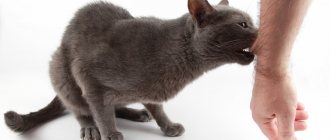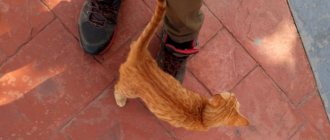No matter what psychologists, behaviorists, veterinarians and crazy cat owners try to tell you, there is one simple, unchanging truth about cats: they are weird. Okay, they're also soft and fluffy, but mostly they're just weird.
Just when you finally think you understand your cat, she suddenly attacks your ankles or decides that the cat food you've been buying for the last six years is suddenly no longer good enough and you just need to take all 36 cans feed that you bought three days ago and exchange it for something else.
We want to help you understand why cats behave the way they do and how to deal with it. Read on to find out how to make your relationship with your cat perfect for both of you.
Purrs and then bites your hand: why do cats suddenly bite when you pet them?
But why do cats react this way? How to stop this?
You should know that your pet does not need too much affection.
If people and cats can live together, it is because we make concessions to them... and they tolerate us in their environment! Cats are free-spirited beings, right? For example, if you sleep with your pet, then she takes up too much space compared to her size.
When we pet our cat, it happens that she bites for no apparent reason.
However, you can anticipate such a reaction thanks to several signals that your furry one sends you.
When a cat begins to cuddle up to the person who is petting it, it means that it wants to be hugged more.
On the other hand, when she believes that she has already received her quota of necessary affection, she conveys some messages, subtle or not, so that the stroking will stop.
The cat begins to cautiously wag its tail, pin its ears back, lick human fingers or dilate its pupils... These are warnings for us to leave it alone.
Too much petting can excite a cat and explain its "violent" behavior. She stops experiencing pleasure from receiving caresses, and the hands that touch her begin to give her an extremely unpleasant sensation.
How to react?
If you have this problem, here's what to do.
First, as mentioned above, it is important to understand and analyze the cat's actions. If she bites, you must be stern, put the animal on the floor and firmly say “no”, and then ignore him.
There is no point in scolding your cat or being aggressive because she won't understand it. Remember also that it is not her fault; she did everything to make it clear to you that she had enough!
But if your cat exhibits aggressive behavior when you pet it in a certain area, it may be because it feels intense pain there. In this case, it is better to consult a veterinarian.
So! Living together with cats requires a compromise, and in a human-cat duo, people must adapt as much as possible! Then your love will be mutual.
Some people believe that cats rarely or almost never bite, but everyone who has pets says the opposite. Often with this behavior they try to tell their owner something, for example, “I don’t like this.” They have thin and sharp teeth, their bites are often painful and do not heal well, and can become infected.
What should the owner of an aggressive cat do?
So what should a cat owner do with an animal suffering from aggression caused by affection? Well, no one is saying it's a lost cause - it's really just a matter of learning how to tune into the animal's mood so you can predict when a petting session might turn into bloodshed. This might mean simply noting how long your cat will tolerate petting before she bites or scratches you, and then making sure you always stop before that moment comes.
Does your cat often scratch or bite you?
Found a violation? Report content
Norm or pathology
Sometimes some cats develop mental disorders, but this cannot be detected on their own. For this purpose, it is worth visiting a veterinarian and telling your concerns about changes in the animal’s behavior and the appearance of unmotivated aggression. Only a specialist will be able to determine whether this is related to pathology or is a character trait.
But most often bites are caused by other reasons. Cats are one of the most independent pets and this needs to be taken into account. And everyone's character is different. While some are very affectionate and love attention from their owner, others don’t like it.
Some animals, even living for a long time in a family, try to keep a distance from people and cannot stand a familiar attitude towards their person. These are already individual character traits and it will not be possible to change temperament.
They are playing
Cats love to play, and sometimes this can turn into biting. Whether it's another cat or your fingers, the results will be the same! When our indoor cats play, they often practice hunting skills that they would use if they lived in the wild. No amount of taming will stop your cat from pouncing on its prey and biting it, even if it's a toy mouse!
- Solution . Allowing your cat to bite you, even if you are just playing, can send mixed messages to her. They won't understand that sometimes biting is okay and sometimes it's not. Direct your cat's attention to the toy, not your hand. Toys attached to a stick and string are great for this purpose as they keep your hands away from those sharp teeth!
© shutterstock
Reasons for unexpected aggression
Cats can bite in different ways. There are two options for this behavior:
- The rarest one is when the pet gently bites its fingers, while the claws are removed and its actions are more pleasant than not. This is what they do most often when communicating with their offspring. When a cat behaves like this with its owner, it means it trusts him and loves him very much.
- More common is a sudden change in behavior. A second ago, the pet took the stroking absolutely calmly, showing no signs of aggression, but now it turned over and began to painfully bite and scratch the hand.
It is important to understand the reasons that motivate cats to bite and scratch their owner's hands. Among the most common are:
Aggression
Often a sign of problems with the pet's socialization. Breeders try to accustom a kitten to stroking in early childhood - up to 7 weeks of age. If this is not done, then in adulthood such an animal will shy away from affection from its owners and bite.
Pain
It is important to remember that cats, like people, are not always healthy; they have stomach, back, head, joint pain, and may have skin problems. Therefore, when showing affection, when something is not right with their health, they can bite. By this they are trying to tell the owner to leave them alone.
If behavior that is not typical appears, you should contact a veterinary clinic for examination, as this may be an indirect sign of illness.
Static electricity
Often, if the animal's fur is too dry and the air humidity is high, microdischarges may form when stroking. A person may not notice this, but it is extremely unpleasant for a pet, so he may bite.
Pet gender
This factor also needs to be taken into account. Many cats are more affectionate, but can be aggressive once they become mothers. Cats are often independent and do not like excessive affection, with the exception of castrated individuals; they begin to show more attention to the owner and demand the same from him.
Increased attention from a person
It must be remembered that these are independent animals that do not like being forced on them. The exception is Oriental cat breeds. Such pets are extremely sociable and loving. But they can also be in a bad mood when affection does not bring pleasure.
Dream
Some cats fall asleep during stroking and, if the rhythm or pressure changes, they may wake up and bite. This behavior is common among poorly socialized pets who always expect trickery from people. Or another situation - the animal is sleeping so soundly that stroking came as a surprise and frightened it. In this case, it is simply a defensive reaction against fear.
Dominant behavior
The cat thus tries to establish himself and show that he is the boss in the house. He tries to control the process of affection on the part of the owner.
Negative experiences in the past
Often people pet their pets before unpleasant procedures, such as nail trimming or bathing. But for them the model is fixed: if they stroked it, something unpleasant happened. And subsequent displays of affection on the part of the owner will provoke biting and scratching.
Early weaning
Cats teach their offspring that a person is a friend, he feeds, caresses and does not cause pain. If you take the kittens away from her too early, they won't recognize it and may perceive people negatively. Pets raised on the street also display a similar pattern of behavior. Cats do not know that their owners are trying to show their love and care in this way, but consider affection a threat to themselves.
Feeding kittens and pregnancy
During this period, some cats may experience a change in character, and in this way they try to protect their offspring and protect them.
Cause of bites and scratches from kittens
When a kitten is still very small, its character is formed. Affectionate ones can lick the owner’s hand, aggressive ones can scratch, bite or completely avoid the person’s attention. There are many reasons for this behavior, each of which has its own educational approach.
Kitten bites
Playful mood of the animal
Every cat reacts in its own way to being close to a person. Attachment to the owner depends on the following factors:
- breeds;
- owner's relationship with the animal;
- acquired character;
- health status.
Playfulness is expressed differently in each breed. For example, the Siberian cat is the most tolerant and rarely shows aggression. Siamese cats bite more often, especially when they are young.
Attention! Female cats are more prone to aggression than female cats.
Often the owner overexpresses his love for the new pet. This may not appeal to everyone. Therefore, growling and attacks begin. This behavior may occur periodically or continuously.
A playful cat does not intentionally offend its owner. For him, this is the norm of behavior; in this way he tries to establish contact with a person. During the game, the cat bites and scratches the owner’s limbs, as this is his way of communication.
If there are many people living in a family, the kitten develops its own attitude towards each of them. More often, favor is observed towards male representatives. Then the attitude towards the owner may be more aggressive or playful. The animal purrs in the man's arms, and scratches the woman's hands.
A cat accustomed to affection
Diseases
If the cat was previously playful and friendly, but suddenly its behavior changed for no apparent reason, this may be due to a disease:
- injury, wound invisible to the naked eye;
- viral and infectious diseases of the respiratory tract;
- stones in the genitourinary system;
- inflammation of internal organs;
- oncological disease.
There may be other reasons why a kitten bites and scratches when petted. Because of them, the cat tries to defend itself, and a response occurs when touched by a person. He may lightly bite his hands or lunge with an attack.
Important! The presence of the disease can be assumed by the fact that the cat begins to sneeze, cough, meow for a long time, sleeps for a long time, and does not touch food.
Aggressive behavior due to illness does not appear gradually, but instantly. If such a sign occurs, it is recommended to immediately contact a veterinarian. The sooner diagnostic tests are carried out, the higher the possibility of a complete cure and normalization of behavior.
Aggressive cat
Overexcitement
The causes of overexcitation may be the following:
- young age, when all the cat’s actions come down to play;
- resentment towards the owner, who could accidentally step on a paw or hit him;
- meeting another animal, especially a feline of the opposite sex;
- spring exacerbation, when the level of hormones in the animal’s blood rises, which is necessary for subsequent mating;
- prolonged play with the owner, which leads to uncontrolled behavior.
Note! Until the cat calms down, it can run quickly, bite the owner’s arms and legs, scratch, and hiss. In this case, no serious measures are required; the cat’s behavior will return to normal when it calms down.
Expression of love
If a kitten or adult bites a person's limbs, the reason may be excessive love and attachment to the owner. In this case, his behavior is not aggressive. At first he can caress, purr, but at the same time bite his fingers. The animal is flirting, so it sharply bites the person. In this case, there is no need to worry, you just need to control his behavior. It is forbidden to show violence, as it will lead to a change from love to aggression.
Aggressive breed
There are cats that start biting, regardless of the owner's attitude. Aggression is often observed in Maine Coons and Siamese. Less often, bad behavior is observed in cats without a breed. Veterinarians believe that this is due to genetic characteristics. Cats are predators by nature, their main goal is to find prey.
Not recommended games with a cat
Aggression is accompanied by the following negative aspects:
- the animal begins to chew on pieces of furniture;
- the cat pees in the corners, the cat can shit in a person’s bed, on the carpet, under the table;
- the tray is completely ignored;
- the pet reacts negatively to the appearance of a child in the family;
- the animal rushes to its feet when a person passes by;
- The cat can tear apart the mattress on the bed, the child’s toys, and clothes.
Important! Aggressive behavior must be stopped in a timely manner, otherwise a certain character will be formed and the cat will be impossible to retrain. This often leads to the owner abandoning the pet.
Response to human violence
Many owners believe that it is impossible to teach an animal to behave correctly with affection. They start beating them and screaming. This leads to a negative reaction in the cat.
For the purpose of self-defense, the animal rushes at a person’s legs, bites, hisses, and scratches. To take revenge for a negative attitude, the cat goes to the toilet in the wrong place, for example, in shoes.
Gradually, aggression increases, the cat becomes uncontrollable. He rushes not only at the owner, but also at other people, because he believes that they will also offend him.
Hunger
A hungry animal is always aggressive. This is due to genetic predisposition. If hunger strikes, the predator must find food for itself. Sometimes, simply by giving the pet food, the owner completely gets rid of bad behavior. If your cat bites after eating, another factor may be causing the problem.
Cat behavior patterns
Experts have identified several behavioral patterns in cats when they can bite people:
A game
It's always aggression, but like studying or training. The objects are models (rubber ball, artificial mouse, rattle on a string, etc.). For kittens, this is training, learning to hunt, which is certainly accompanied by bites. Therefore, you should not play with your hands or feet with your pets, as they begin to be perceived as a “victim” that needs to be caught and neutralized. When playing with children, at first this behavior is amusing, but this pattern of play will become ingrained in him and in adulthood it will be difficult to wean him off this pattern.
You need to entertain your pets only with the help of special devices for cats.
Host - food
People are a source of food for their pets, so you shouldn’t tease them with food or treats, much less leave it all in a visible place. By biting and scratching, cats try to get their owners to give them another portion of goodies.
Licking the owner's hand - biting
Often people who keep a cat at home are surprised by this pattern: the pet was just purring and licking its fingers and suddenly bit. There may be several reasons for this behavior. For example, unrealized maternal instinct. When licking their offspring, cats may bite. Or it could be a sudden change in the animal's mood. Thus, the pet wants to say that he is tired of affection and needs to be left alone. To prevent such incidents, it is important to pay attention to the cat’s body language and notice changes in his mood. Thus, twitching of the tail and skin on the back, billowing fur indicate an imminent attack on the owner’s hand.
Resentment
For the most part, cats are not vindictive and do not hold grudges for long. But when the owner does not allow them to play with some object or does not allow them into a certain room, they can get angry and show their dissatisfaction with this by biting. With this behavior, you need to try to switch the pet’s attention to another thing, try to distract it with a game.
Secondary aggression
Cats are very addicting creatures and often after an interesting game with an artificial mouse, the owner, wanting to pet the pet, gets hit on the hand with a clawed paw. This happens because the animal has not calmed down and is still in the process of playing for a little while.
The recipe for this behavior is simple - let the cat calm down a little, and after time has passed, pet it.
Primary aggression
Often, in response to physical punishment, the pet begins to show hostility towards the owner. This is due to the fact that he adopts a human behavior model and enters into a kind of fight. It is important to remember that physical punishment is not the best way to raise cats and should not be used. You should scare him with a loud sound or sprinkle water to stop the attack. Sometimes primary aggression indicates an illness in the pet, so if all other reasons for this behavior are excluded, but if the cat continues to rush at people, you need to take him to a veterinarian for examination.
Why does he bite after licking?
Many owners are perplexed when a cat purrs, caresses, and then suddenly shows aggression. The reason why a cat licks and then bites is most often an unfulfilled desire. For example, an animal, caressing it, demands to treat it with something tasty or to caress it, to pay attention to it. And for some reason a person ignores such a persistent request from an animal’s point of view.
In this situation, the pet is forced, firstly, to demand what he wants using the methods available to him, and, secondly, to throw out the negative feeling with the help of aggression due to the impossibility of its realization.
The reason why a cat purrs and bites is often due to careless handling of the furry couch potato. The owner and household members sometimes forget that cats are very sensitive to caresses in the abdominal area. This is due to the fact that the abdomen is a vital area in which the main organs are located. Damage to the abdominal cavity threatens the animal with death. Therefore, cats are especially sensitive to affection when they begin to be stroked in this place.
This instinctive behavior relates to issues of self-preservation of the feline species. It is not surprising that the owner, having forgotten about this feature of pets, will receive rebuff and be bitten or scratched.
Why does a cat bite just like that?
For the most part, cats never bite for no reason, but there are situations when people feel as if they are being attacked for no reason. However, this is not the case and there are several factors influencing this behavior, in addition to those described above. These include:
- Changing teeth. Animals, like humans, first grow baby teeth, which are subsequently replaced by permanent teeth. In cats, this period begins at 3-4 months of age. In this case, there may be pain and discomfort in the oral cavity, and they begin to actively bite the owner’s hands. It is important to prevent the pattern of such behavior from becoming established at this point. Otherwise, even an adult animal will continue to gnaw people’s fingers. You need to buy special rubber toys that your pet will scratch his teeth on.
- Sexual desire. During this period, many cats become aggressive. This is easy to notice: they leave marks on the territory of the apartment, scream heart-rendingly and ask to go outside. There are two options for solving the problem: castration and selection of a partner.
- Declaw removal. Currently, this inhumane operation is common in veterinary practice. If after it the pet begins to bite, this indicates either revenge, or that his teeth are the only weapon with which he can stand up for himself and this is what the cat uses.
- Lack of attention from people. If the pet is not played with and petted a lot, a bite is its way to interest the owner. You should devote at least 10 minutes a day to communicate with your pet, and the problem will disappear.
- Lack of care. If the tray is not cleaned or there is a lack of food, the cat tries to let the owner know that it is time to clean up his toilet or feed him.
They are teething
As your kitten begins to lose her baby teeth and her adult teeth emerge, her gums can become sore and irritated. One way to relieve this pain is to chew on something, like a teething baby!
- Solution . If you know your kitten is teething, offer him a few safe things to chew on instead of your fingers. Some kittens like to chew cardboard, just keep an eye on them to make sure they don't eat anything. Others prefer rubber chew toys, and often a puppy toy will work just fine! Once your kitten starts teething, the pain will subside and he will stop chewing.
© shutterstock
How to recognize readiness for an attack
Cats do not bite without warning; it is important to pay attention to the signs before attacking. These include:
- the animal's posture changes;
- the pet’s body tenses, which can be felt when touched;
- the purring suddenly stops;
- ears flatten;
- anger in the gaze, pupils dilate;
- the nature of the sounds produced becomes threatening, for example, rumbling, purring;
- the expression of the muzzle changes from peaceful to angry;
- the tail begins to twitch.
One or a combination of signs indicate that the pet is aggressive, that it has begun to get angry and that it will soon attack a person. You should not ignore them, but it is better to leave the cat alone for a while so that he calms down.
They're stressed
Some cats will chew or eat non-food items when stressed. This can be a form of calming behavior. Some breeds, including Siamese cats, are more likely to chew things to reduce anxiety. If you've been working longer hours, rearranging furniture, or bringing home a new pet, these can all cause stress for your cat.
- Solution . Talk to your veterinarian about ways to minimize stress. Make sure your cat's environment is sufficiently enriched. Introduce new pets slowly and consider using a cat pheromone diffuser to help your cat feel more secure and balanced.
How to stop a cat from biting
There are several techniques that can be used to rid your pet of a bad habit and prevent it from developing. These include:
- Proper communication with guests. A kitten should not perceive people as aggressors, so it is worth accustoming it to them from a young age. But it is also important that those who come behave with respect for the pet: do not pick him up if he does not like it, do not throw him up (he may get scared) and do not bother him too much. If an animal has huddled in a corner in front of guests, there is no need to drag it out of its shelter to show off to your friends.
- Your pet should have toys with which he can have fun, but should not play with his hands.
- If a cat bites, you should make a sharp sound and he will let go, as it is unpleasant for him. For example, clap your hands or shout sharply.
- If episodes of aggression have become frequent, and all familiar causes of such behavior have been ruled out, it is worth visiting a veterinarian; the problem may be a pet illness.
- After the bite, show the cat that it is unpleasant. You can ignore requests for a treat or to continue playing.
- It is important for the owner to determine the approximate time during which the pet allows stroking and not to neglect this knowledge.
- In case of frequent bites, you can prepare a container with a spray bottle and spray it on the cat in case of aggression. He will get scared and run away. This will wean him from such behavior.
- Get vaccinated against rabies regularly. Your pet can become infected with this incurable disease and become dangerous to others. Therefore, you should not neglect regular visits to the veterinary clinic.
What to do if kittens bite: parenting recommendations
Kittens, like children, need to be raised, only this is done differently. It is important to remember that the sooner you start this process, the more effective it will be.
It is more difficult to retrain an adult animal than a baby. If he bites hard, you need to stop playing and clearly, loudly say “No” and stop interacting with him, ignore him for a while. You can hiss at him after a bite. Another option is possible - to switch attention to something else, for example, a toy, but you cannot give a treat. Otherwise, he will take this as praise and will continue to behave aggressively towards people.
It is important for the owner to pay attention to the pet’s character and favorite places for petting. So, some cats like to be stroked on their bellies, while others categorically cannot stand it and allow themselves to be touched only on their backs.
In any case, it is necessary to find out the cause of aggressive behavior and eliminate the factors leading to it. If you can’t cope on your own, you can seek help from specialists.
They were weaned too early
Most kittens naturally begin to wean around 8 weeks of age. If your kitten has been weaned before, or suddenly separated from its mother, it may sometimes seek comfort by imitating the sucking motion. While most cats will use a soft blanket to do this, some may grab your hand or fingers instead.
- Solution . If your cat constantly sucks on your hand or other inappropriate object, ask your veterinarian or cat behaviorist for advice. Sometimes you can give your cat a stuffed toy or blanket instead. This is a calming behavior for cats, so you don't have to force your cat to stop sucking altogether.
Posted by Emma Stenhouse Emma is a freelance writer specializing in pets, outdoor activities and the environment. Originally from the UK, she lived in Costa Rica and New Zealand before moving to a small holding in Spain with her husband, their 4-year-old daughter and their dogs, cats, horses and birds.











